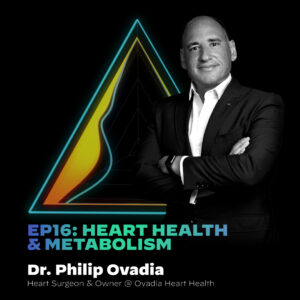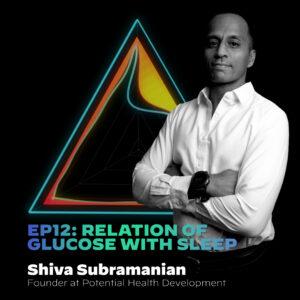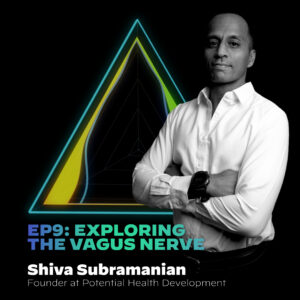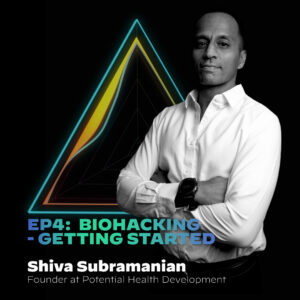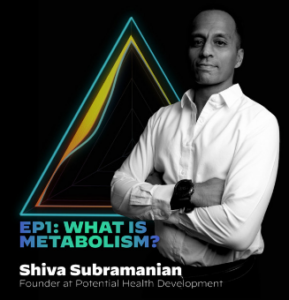Introduction Of Podcast
With evolution, human beings as we know have been on a change. In this episode, Shiva & Mohit discuss how environment has a role to play in your sleep and thereby, your metabolic health. Tune in.
Timestamps
- (00:00 – 03:03) – Introduction
- (03:18 – 07:29) – Environmental Factors Affecting Sleep
- (07:30 – 12:39) – Impact of Sleep on Metabolic Health
Key Takeaways – Transcripts
Intro (Mohit): One of the Cyborgs I was speaking to was telling me that how living a more relaxed life, being able to control stress, actually led to much better glucose controls. And in another scenario, somebody mentioned that just by regulating their light environment, which is by getting the right type of light at the right point in time, which is basically you can say a little bit of sunlight in the morning and the right spectrum and then basically avoiding blue light in late evening actually led to improvement in the glucose control and effectively glucose variability. So that’s really interesting because when we think about glucose, we always think about food. We think that food has glucose. and if I control food, everything is sorted. But it seems way more complicated than, or actually way more diverse than just being able to look at your food. So, we already know that polluted air, soil, water, unhealthy diet, stress, lack of physical activity, vitamin D deficiency, all of these things also affect, in fact, your immune system also affects how metabolically healthy you are. And that’s because when we think about metabolism, which is sort of like your, you can say the energy generation engine of your body, the body essentially figures out where to dedicate more energy to and how to dedicate it, right? When you see your environment changing, your body’s metabolic response also changes. So why is this important? And why studying this is important is because the environment that we live in is not the same as what our evolutionary journey would have seen. We are probably at the time where most of the things around us are extremely different compared to our evolutionary scenarios. Our food environment is different, our sleep environment is different, our stress environment is different, and you can say the supply chain of our food is different. So, all of these things, given that each of these things play a huge role in regulating and managing the metabolic system, these systems also affect how we need to optimize the state of our metabolic system. So, one primary example is the amount of light we get and the amount of light we get. And the type of light we get actually regulates our circadian rhythm and that actually regulates how much or what quality of sleep do we get? Quality of sleep actually affects what? Your glucose response, how insulin sensitive you are. So, insulin sensitivity related to sleep, related to circadian rhythm, related to light, that’s how sensitive we are as human beings. And given that our light environment has changed, we are getting way more blue light that maybe somebody even like ten years back or maybe 20 years back, even our screen time. And given the amount of gadgets flying all around us, you can imagine the amount of downstream effects that the light environment would have had on the metabolic system and everything else as well. So, this is one of the factors of many factors. But there’s much more. So let’s get started.
Question (Mohit): So, Shiva, so there is a Palaeolithic reason why we are here, right? How we are here essentially, right? But then there would be environmental factors that would have also evolved not in our favor apart from human movement. So, what could some of those environmental factors be For example, the simplest one to understand for me is, for example, stress. The amount of stress that we have all around. Also, a different type, not the fight or flight one, but basically the physical danger of an animal, but basically the mental stress is significantly higher. But are there other factors like light and food supply chain ecosystem? What would some of those factors be?
Answer (Shiva): I think you’re right. It’s all of that put together, really. Let’s look at just light itself, right? We followed a circadian rhythm circumstance. During the day, all our cells, each cell has got a clock to be in sync with the sun or to be in sync with your day and night. Now obviously, that’s your blue light thing that happens today. Everybody’s on the computer in the evening watching TV, whatever it is, right? We know for a fact that blue light reduces melatonin, which is something that helps you trigger sleep. Now, it’s not something that’s going to put you to sleep, it’s something that triggers sleep. Now, if you don’t have melatonin, all the other housekeeping things that have to happen in your body is not delayed.
Question (Mohit): That’s very interesting. Like triggers and put you to sleep. What’s the major difference?
Answer (Shiva): Melatonin actually is not something that’s going to keep you asleep, right? If you look at Matthew Walker’s recent research on his book, and this guy is one of the best sleep guys around today, what he’s saying is melatonin is a key that helps you trigger you have a lot of adenosines in your brain, right? And these are all sleep pressure things. And the point is to start the sleep or it’s the match, it’s not the fire.
(Mohit): It’s also called the master switch.
(Shiva): That’s it. It’s just a switch, right? So, you want to think about it as a switch, not think about it as something that’s going to keep you to sleep. Because with the modern day, the nutraceuticals, the marketing, it may come across as something that’s going to keep you asleep.
(Mohit): As a supplement. Yes, it is. That’s how it’s portrayed today.
(Shiva): So, you got to be careful with those things, right? And you’re saying like, look, I’m not making it naturally, but I can buy it off the shelf. It doesn’t quite work like that’s your backup when you have jet lag and stuff like that, it’s a great tool to use, right?
(Mohit): Wow. But the way it is now being marketed globally, it almost feels like it’s a sleeping pill, right? It’s not really being portrayed like a hormone or that there could be downstream effects of undermanagng it. Or over managing it. Yeah, that seems really interesting. Like being a switch versus actually being something that actually puts you to sleep.
(Shiva): Well, because I think that we often mix the clinical aspects of sleep pills with melatonin and things natural. There are so many things, because the human brain makes connections the way it wants to. There’s this amazing thing, I think it’s called the psychological law of reactants. I think this is the one. And basically, what you say is what you believe. So, if you believe that’s true, that’s pretty much how it goes, right? And this is a human condition. I don’t think it’s good or bad. It helped us in some ways, it doesn’t help us in other ways, right? So, the same thing, if you say it long enough, you’re going to believe it. And if that works for you, maybe it’s a placebo, it doesn’t really matter, it’s a tool. Now, again, melatonin is going to work differently for different people. For some people, it’s going to make them sluggish. For some people, it’s going to make them get up at night. And this is what I meant by the observer. It’s not to have any judgment on it, it’s to say it’s a tool. How do you use it, when do you use it and how do you get rid of it? Because the tool is just a tool. At some point, you want to get rid of the tool. If you need a band aid, you’re going through something, use it. How can we create we are designed to create our own melatonin. The question we should ask is, why aren’t we? Is it because let’s go back. Is it because of the blue light? Is it because of coffee? Is it because of some other clinical drugs that we’re taking? And then when you begin to look at it from that perspective, suddenly there is a different way you can approach it and same way in the morning, you need cortisol that’s going to wake you up, because that’s the other spike that you have in the morning that wakes you up, right? So, there’s always a continuum. Mohit, the best way to look at it is like there’s a huge bell curve, right? And everything you can fall on either side of it and it’s not so great. It’s getting that sweet spot that’s so difficult for all of us.
Question (Mohit): So, you mentioned that light is a critical element because it triggers melatonin in cells, essentially, right? So how does that really affect the health of an individual? Or specifically metabolic health?
Answer (Shiva): Let’s say it’s perfect, right? Because let’s look at it. If you don’t sleep enough and you don’t get sleep, is broken down into non-REM and REM sleep. Now, if you’re not going to get sleep earlier in the evening and it’s going to be delaying it, you’re going to lose this N-REM sleep. And NRM sleep is going to cause lots of other issues in your system, especially with learning and your short-term memory going into your long term memory so that’s I know it affects your hippocampus and before it’s translated into the prefrontal cortex where the memory is consolidated, right? So, you’re talking about like whatever you learn during the day, you’ve lost it because you haven’t got the sleep in the evening. The other thing that could also happen is your REM sleep and this is earlier in the morning. So, the later you sleep. But most people are waking up with alarm clocks today. You’re not naturally waking up with the sun. Now, if you think about that, then you’re missing some sleep out in the morning, right? And by the way, this is all from Matthew Walker because this guy has done some amazing work and he’s put a lot of information on sleep, right? And it’s fantastic all this information is available. But this is the problem, isn’t it? I mean, how does everybody access this information? It becomes difficult. So that’s what when we’re having this conversation, it’s easy because we do this for all our clients. Whoever comes in, the idea is to be able to walk them through this without them knowing about it, right? You’re just guiding and saying like, look, this is better, this is worse. Who has the time to go through all these iterations and see what you’re damaging? So let me go back to that because if your brain is affected by lack of sleep, your emotion, like especially the amygdalla, you’re not in control anymore. You lose your ability to inhibit. Now, here’s what’s really interesting about food. Let’s go to metabolic health and then let’s get into the next iteration of it. If you have a lack of sleep because you’re sleeping less hours, less than 6 hours a day, right, the amount of glucose that you can absorb the next day is half. The rest of it is going to go to fat. Do you know that? Because your muscles become almost insulin resistant the next day, your physical activity levels come down by 30%. So, you’re saying like, say you lift 70 kilos and this is your bench press. Trust me, the next day you’re doing 30% less because you haven’t shut up properly. It’s a compounding effect, right? Now you keep going down that you’re getting further and further into a lack of control and lack of performance. So, this becomes really interesting because you asked about metabolic health. Now your glucose level is going to go up. It’s a stress response.
(Mohit): Something as simple as light. And the amount of light we get affects sleep and sleep affects performance as well as basically glucose disposition in the body. And that has a ton of downstream effects, basically, which is in the realm of metabolic health.
(Shiva): I remember there was some papers that they got these guys to be sleep deprived for a week and they just got insulin resistant. And on paper you could see that they were pre-diabetic. That’s it. It just takes a week, so my point is imagine all the sleepless nights that people are doing, right and continuum of that and then not able to switch back and then there you go. But you see this is just one aspect of it. The problem with these things is that when you just talk about this it looks like wow, we’re getting diabetes because we don’t sleep. It’s not true. It’s because this is one small element or contributor because there are people with different kinds of genetics. And one of the things on sleep research is they found that there are different kinds of people with different circadian rhythms, right? This comes from our tribal psychology maybe, right? Where you had guys who would get up early in the morning, sleep late at night, all those things. But look, our society is not geared for that. Say you’re a late sleeper in the morning, okay, let’s just say that your design process is that you like to work later in the evening and sleep in the morning. Most of your REM sleep is going to happen in the morning but you have to get up with the rest of the world because you have to go to office at 8:30 or 9. That means you’re going to be ruining your REM sleep no matter what because the world is not designed for you. But unfortunately, you’re not designed like that. You’re not designed to fit into a paradigm, and this is the benefits of genetics and precision medicine which gives you some clues to unravel this, right? On how you can make it better. So, there are companies in the world today that will actually change working times for different people because it’s about the work that gets done, it’s not about efficiency. And also, if you look at the number of sick days that you have because of a lack of sleep, there will be other compounding effects but these become very interesting because I don’t think that we’re not taking anything in terms of variability or genetic variability or these things, right? So yeah, even if you correct your sleep, it doesn’t necessarily mean that you’re going to fall in and that’s the complexity. Isn’t it moist? Because you’re now getting into like a micro level of each person and saying what works for you. Right, and this is what we have the capability of doing today. But we’re still viewing everything from a huge mass perspective where we are still generalizing it. I suppose there is a small offset in terms of what is good for a whole society may not work for every individual.
(Mohit): I think that’s also fair because 80% itself, I mean we’re still solving the 80% which is like sleeping at the same time every day or getting 8 hours in or maybe more for performance and recovery and also basically having more awareness of sleep being a performance enhancer. I would say that definitely evolved but still treat lack of sleep sometimes as a marker of status and sometimes a marker of performance as well, which is like, very weird. And maybe just ten years back, not specifically targeting those 05:00 A.m. Clubs, but for people who view sleep as something that is keeping you lazy versus sleep as a performance aid, this is a whole world of a difference. But yeah, sleep is both complex and simple at the same time. Like, it’s the simplest human activities that you can do, human things that you can do, and the most complex ones to regulate as well.
Outro (Mohit): I hope that with this discussion, you gained an insight into how important your environment is and how much it affects your metabolic system and your metabolic health. If taken care of. It can become one of the most effortless and one of the most passive ways to improve your overall health. And not just metabolic health, but if not taken care of, it could make everything else harder. Let us know of an incident where a change in environment caused a change in your glucose patterns and your metabolic health by tagging @UltrahumanHQ on Twitter and Instagram. We are eager to hear from you. Also, don’t forget to share this podcast with your friends and family. Keep at your metabolic health journey. See you soon.




